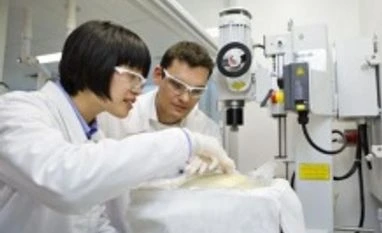Global chemical major BASF broke ground on the second phase of its Innovation Campus Asia Pacific at its Pudong site in Shanghai, China. The Euro 90 million expansion consists of an additional regional research and development (R&D) building and auxiliary facilities and it will be completed by the end of 2015.
Dr Andreas Kreimeyer, member of the Board of Executive Directors of BASF SE and Research Executive Director, said, “By 2020, around 25% of BASF’s R&D employees will be located in Asia Pacific. The expansion reinforces BASF’s commitment to globalising its R&D activities and capturing growth opportunities in China and Asia Pacific.”
The Innovation Campus is BASF’s most important R&D centre in the region and is expected to become one of its largest R&D sites outside of Germany. With the expansion, BASF’s regional research capabilities will be further strengthened, focusing primarily on advanced materials and systems as well as adding new areas such as formulations and chemical process and engineering serving growth industries such as automotive, construction, health and nutrition, and home and personal care.
“The Innovation Campus Asia Pacific in Shanghai has proven to be an effective platform that not only responds quickly to market needs in China and Asia Pacific, but also connects BASF with the science community in Asia Pacific. The enthusiasm for innovation among our colleagues, customers and partners is the cornerstone of solutions for a sustainable future in the region,” said Dr Martin Brudermuller, Vice Chairman of the Board of Executive Directors of BASF SE, responsible for Asia Pacific.
Eighteen months after its inauguration, the Innovation Campus Asia Pacific has strengthened BASF’s position as the preferred innovation partner for customers in the region, for example from the construction, automotive, paint and coatings, home and personal care and packaging industries.
Leveraging local market insights and BASF’s strong global R&D network, the teams focus on innovative solutions to address the market needs in various industries across the region. For example, the world’s first co-extrudable Ultradur (polybutylene terephthalate) for the reinforcement of thermally insulated polyvinyl chloride (PVC) window profile, was developed together with Dalian Shide Group. Steel in a PVC window profile is replaced with co-extrudable Ultradur to provide high strength but lightweight reinforcement with mechanical properties required to withstand strong winds and excellent thermal insulation, which enables energy-efficient construction.
In Asia, in addition to the Innovation Campus in Shanghai, BASF also has R&D centres in Japan, Singapore and Korea. An Innovation Campus in India is also planned. BASF increased global spending on research and development to Euro 1.8 billion in 2013 (2012: Euro 1.7 billion), with around 10,650 scientists and researchers working in 3,000 research projects.
Dr Andreas Kreimeyer, member of the Board of Executive Directors of BASF SE and Research Executive Director, said, “By 2020, around 25% of BASF’s R&D employees will be located in Asia Pacific. The expansion reinforces BASF’s commitment to globalising its R&D activities and capturing growth opportunities in China and Asia Pacific.”
The Innovation Campus is BASF’s most important R&D centre in the region and is expected to become one of its largest R&D sites outside of Germany. With the expansion, BASF’s regional research capabilities will be further strengthened, focusing primarily on advanced materials and systems as well as adding new areas such as formulations and chemical process and engineering serving growth industries such as automotive, construction, health and nutrition, and home and personal care.
“The Innovation Campus Asia Pacific in Shanghai has proven to be an effective platform that not only responds quickly to market needs in China and Asia Pacific, but also connects BASF with the science community in Asia Pacific. The enthusiasm for innovation among our colleagues, customers and partners is the cornerstone of solutions for a sustainable future in the region,” said Dr Martin Brudermuller, Vice Chairman of the Board of Executive Directors of BASF SE, responsible for Asia Pacific.
More From This Section
Eighteen months after its inauguration, the Innovation Campus Asia Pacific has strengthened BASF’s position as the preferred innovation partner for customers in the region, for example from the construction, automotive, paint and coatings, home and personal care and packaging industries.
Leveraging local market insights and BASF’s strong global R&D network, the teams focus on innovative solutions to address the market needs in various industries across the region. For example, the world’s first co-extrudable Ultradur (polybutylene terephthalate) for the reinforcement of thermally insulated polyvinyl chloride (PVC) window profile, was developed together with Dalian Shide Group. Steel in a PVC window profile is replaced with co-extrudable Ultradur to provide high strength but lightweight reinforcement with mechanical properties required to withstand strong winds and excellent thermal insulation, which enables energy-efficient construction.
In Asia, in addition to the Innovation Campus in Shanghai, BASF also has R&D centres in Japan, Singapore and Korea. An Innovation Campus in India is also planned. BASF increased global spending on research and development to Euro 1.8 billion in 2013 (2012: Euro 1.7 billion), with around 10,650 scientists and researchers working in 3,000 research projects.
)